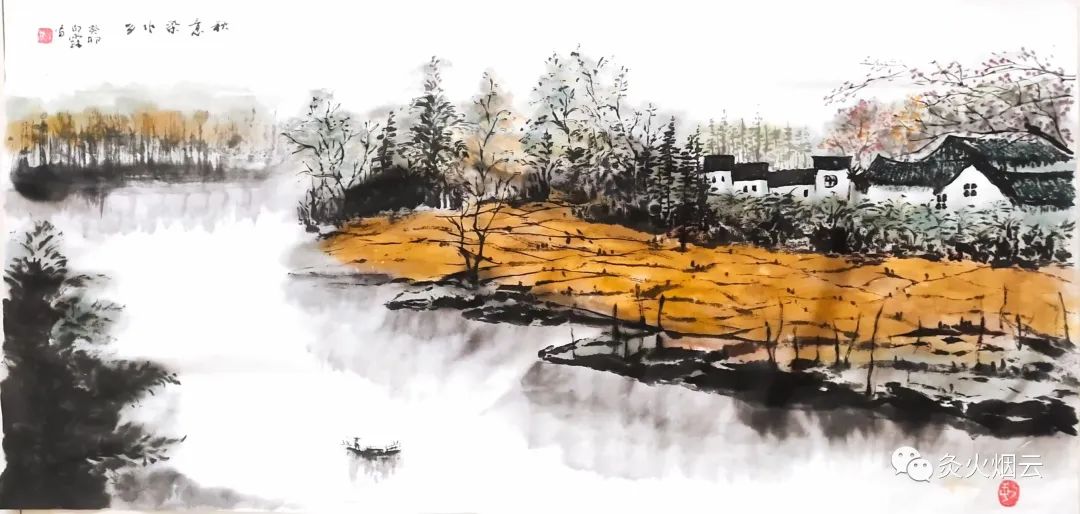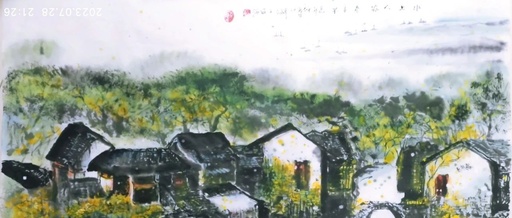
(National Painting Author WeChat Public Account: Northern Birch Forest)
Spleen and Stomach Yang Deficiency with Cold is a syndrome characterized by the deficiency of Yang Qi in the spleen and stomach, leading to an excess of Yin and cold. This includes both Spleen Yang Deficiency and Stomach Yang Deficiency, often caused by dietary irregularities, excessive consumption of junk food, cold foods, beer, overwork, prolonged illness, or emotional distress affecting the spleen. One should not overlook the impact of negative emotions and personality traits on the organs. Some people may experience a significant decrease in appetite when feeling down, while others may binge eat, both of which negatively affect the spleen and stomach, subsequently impacting overall health.
Spleen Yang Deficiency may present with symptoms such as poor appetite, abdominal distension, cold pain in the abdomen or stomach that prefers warmth and pressure, a pale and moist tongue, and a slow, weak pulse. Other symptoms include cold extremities, loose stools, abdominal rumbling, or edema in the limbs, with a preference for warmth and aversion to cold.
Cold weather or the consumption of cold foods and drinks can trigger stomach pain and abdominal pain, often accompanied by a sensation of cold in the abdomen or stomach. Symptoms may improve with warmth.
Some individuals may frequently feel a dull, persistent stomach ache that worsens with cold exposure and improves with warmth and pressure. They cannot tolerate an empty stomach, as pain intensifies when fasting, but eating a little can provide some relief. Pain may also worsen after fatigue, consuming cold foods, or exposure to cold. They may also experience frequent vomiting of clear fluids, very little food intake, and fatigue.
If the condition leans towards Stomach Yang Deficiency, the key diagnostic point is the inability of the stomach to harmonize and descend, leading to symptoms such as easy vomiting, stomach pain, bloating, and a sensation of obstruction in the stomach, especially after consuming cold foods.
Spleen Yang Deficiency is characterized by the spleen’s inability to transport and the failure of clear Yang to rise, manifesting as abdominal distension, reduced appetite, abdominal pain that prefers warmth and pressure, clear fluid regurgitation, loose stools, cold extremities, or heaviness in the limbs, and generalized edema (especially around the eyelids and face). There may also be difficulty urinating, with small amounts of urine produced each time. Women may experience excessive, thin vaginal discharge, and there may be a sensation of heaviness in the lower abdomen, with lower back pain. Individuals may be prone to dizziness, fatigue, and a pale or sallow complexion, often leading to anemia. The tongue is pale and swollen, with a white, slippery coating, and the pulse is slow and weak.
Since the spleen and stomach are the foundation of postnatal health, individuals with spleen and stomach issues often find it difficult to be robust, leading to weakness and poor immunity. If there are other health issues, failing to address the spleen and stomach will likely result in unsatisfactory treatment outcomes. Simply put, only by having a good appetite and consuming nutritious food can one maintain vital life activities. Otherwise, even the best supplements will be of no use. Furthermore, Spleen and Stomach Yang Deficiency not only hinders the absorption of nutrients but also makes it more difficult for medications to be absorbed, as medications are not as gentle as food and have specific properties to correct imbalances and treat diseases. Therefore, a healthy spleen and stomach are essential for the transformation and absorption of nutrients.
From the detailed introduction above, you should now understand the manifestations of Spleen and Stomach Yang Deficiency and the importance of a healthy spleen and stomach. The general principle for addressing Spleen and Stomach Yang Deficiency is to warm the center, strengthen the spleen, and dispel cold. If the condition is solely Spleen and Stomach Yang Deficiency, we typically use Li Zhong Wan (Regulate the Middle Pill). If there are accompanying symptoms of cold intolerance or cold extremities, then Fu Zi Li Zhong Wan (Aconite Regulate the Middle Pill) should be used.
1. Li Zhong Wan (Regulate the Middle Pill)
Dang Shen (Codonopsis), Chao Bai Zhu (Fried Atractylodes), Zhi Gan Cao (Honey-fried Licorice), Pao Gan Jiang (Pounded Dried Ginger)
This formula has the effect of warming the center, dispersing cold, and strengthening the spleen and stomach. It is used for symptoms of vomiting, loose stools, abdominal pain, fatigue, and mild cold intolerance associated with Spleen and Stomach Yang Deficiency.
In this formula, Pao Gan Jiang is milder than Gan Jiang (Dried Ginger) and is suitable for warming the center and dispersing cold, strengthening Spleen Yang, and warming the middle jiao, while also alleviating stomach acid. Dang Shen is sweet and warm, tonifying the spleen, benefiting Qi, and nourishing the foundation of postnatal health, thus enhancing Spleen and Stomach strength and improving loose stools caused by Spleen and Stomach Yang Deficiency. Chao Bai Zhu is sweet and bitter, strengthening the spleen and eliminating cold dampness, as prolonged cold in the spleen and stomach can easily lead to dampness, thus improving symptoms such as excessive drinking leading to bloating, loose stools, and difficulty urinating. Zhi Gan Cao is sweet and warm, tonifying the spleen, benefiting Qi, harmonizing the other herbs, and enhancing the overall effectiveness of the formula.
2. Fu Zi Li Zhong Wan (Aconite Regulate the Middle Pill)
Fu Zi (Aconite), Ren Shen (Ginseng), Gan Jiang (Dried Ginger), Gan Cao (Licorice), Bai Zhu (Atractylodes)
This formula is similar to Li Zhong Wan but has a much stronger warming effect. While Li Zhong Wan can also dispel internal cold, its effect is significantly less than that of Fu Zi Li Zhong Wan. Therefore, Fu Zi Li Zhong Wan can be used for cold pain in the abdomen, vomiting, diarrhea, loud intestinal sounds, cold extremities, and general cold intolerance, along with weakness and fatigue.
In this formula, Fu Zi is used to tonify fire and assist Yang, warming the kidneys and spleen. Gan Jiang is spicy and hot, warming and promoting Spleen Yang, specifically warming the spleen and middle jiao, dispelling cold, and stopping diarrhea. There is a saying that “without ginger, Aconite cannot be hot,” thus Gan Jiang and Fu Zi complement each other, forming a powerful cold-dispelling effect. Ren Shen is sweet and warm, greatly tonifying Yuan Qi, benefiting the spleen and stomach, and treating central deficiency. Bai Zhu is bitter and warm, strengthening the spleen and drying dampness, working with Ren Shen to restore proper movement and elevation, thus providing assistance. Gan Cao benefits Qi, tonifies the center, alleviates pain, and harmonizes the properties of the herbs, serving as a guiding herb. The entire formula works together to warm the center, strengthen the spleen, and dispel internal cold. Compared to Li Zhong Wan, Fu Zi Li Zhong Wan has a more powerful tonifying effect and a stronger ability to warm the spleen and stomach, as well as dispel internal cold.
 Person
Person

